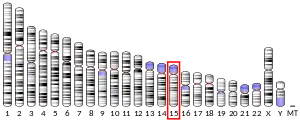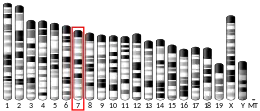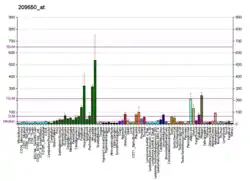NDN (gene)
Necdin is a protein that in humans is encoded by the NDN gene.[5][6]
Function
This intronless gene is located in the Prader-Willi syndrome (PWS) deletion region. It is an imprinted gene and is expressed exclusively from the paternal allele. Studies in mice suggest that the protein encoded by this gene may suppress growth in postmitotic neurons.[6]
Necdin is used to stimulate growth regulation and DNA-dependent transcription regulation.[7]
Interactions
NDN (gene) has been shown to interact with:
References
- ENSG00000288364 GRCh38: Ensembl release 89: ENSG00000182636, ENSG00000288364 - Ensembl, May 2017
- GRCm38: Ensembl release 89: ENSMUSG00000033585 - Ensembl, May 2017
- "Human PubMed Reference:". National Center for Biotechnology Information, U.S. National Library of Medicine.
- "Mouse PubMed Reference:". National Center for Biotechnology Information, U.S. National Library of Medicine.
- MacDonald HR, Wevrick R (January 1998). "The necdin gene is deleted in Prader-Willi syndrome and is imprinted in human and mouse". Hum Mol Genet. 6 (11): 1873–8. doi:10.1093/hmg/6.11.1873. PMID 9302265.
- "Entrez Gene: NDN necdin homolog (mouse)".
- Uniprot
- Taniura H, Taniguchi N, Hara M, Yoshikawa K (January 1998). "Necdin, a postmitotic neuron-specific growth suppressor, interacts with viral transforming proteins and cellular transcription factor E2F1". J. Biol. Chem. 273 (2): 720–8. doi:10.1074/jbc.273.2.720. PMID 9422723.
- Kuwako K, Taniura H, Yoshikawa K (January 2004). "Necdin-related MAGE proteins differentially interact with the E2F1 transcription factor and the p75 neurotrophin receptor". J. Biol. Chem. 279 (3): 1703–12. doi:10.1074/jbc.M308454200. PMID 14593116.
- Taniura H, Yoshikawa K (2002). "Necdin interacts with the ribonucleoprotein hnRNP U in the nuclear matrix". J. Cell. Biochem. 84 (3): 545–55. doi:10.1002/jcb.10047. PMID 11813259. S2CID 5988824.
- Hu B, Wang S, Zhang Y, Feghali CA, Dingman JR, Wright TM (August 2003). "A nuclear target for interleukin-1alpha: interaction with the growth suppressor necdin modulates proliferation and collagen expression". Proc. Natl. Acad. Sci. U.S.A. 100 (17): 10008–13. Bibcode:2003PNAS..10010008H. doi:10.1073/pnas.1737765100. PMC 187743. PMID 12913118.
- Bronfman FC, Tcherpakov M, Jovin TM, Fainzilber M (April 2003). "Ligand-induced internalization of the p75 neurotrophin receptor: a slow route to the signaling endosome". J. Neurosci. 23 (8): 3209–20. doi:10.1523/JNEUROSCI.23-08-03209.2003. PMC 6742322. PMID 12716928.
- Tcherpakov M, Bronfman FC, Conticello SG, Vaskovsky A, Levy Z, Niinobe M, Yoshikawa K, Arenas E, Fainzilber M (December 2002). "The p75 neurotrophin receptor interacts with multiple MAGE proteins". J. Biol. Chem. 277 (51): 49101–4. doi:10.1074/jbc.C200533200. PMID 12414813.
- Taniguchi N, Taniura H, Niinobe M, Takayama C, Tominaga-Yoshino K, Ogura A, Yoshikawa K (October 2000). "The postmitotic growth suppressor necdin interacts with a calcium-binding protein (NEFA) in neuronal cytoplasm". J. Biol. Chem. 275 (41): 31674–81. doi:10.1074/jbc.M005103200. PMID 10915798.
- Taniura H, Matsumoto K, Yoshikawa K (June 1999). "Physical and functional interactions of neuronal growth suppressor necdin with p53". J. Biol. Chem. 274 (23): 16242–8. doi:10.1074/jbc.274.23.16242. PMID 10347180.
Further reading
- Aizawa T, Maruyama K, Kondo H, Yoshikawa K (1992). "Expression of necdin, an embryonal carcinoma-derived nuclear protein, in developing mouse brain". Brain Res. Dev. Brain Res. 68 (2): 265–74. doi:10.1016/0165-3806(92)90069-9. PMID 1394972.
- Jay P, Rougeulle C, Massacrier A, Moncla A, Mattei MG, Malzac P, Roëckel N, Taviaux S, Lefranc JL, Cau P, Berta P, Lalande M, Muscatelli F (1997). "The human necdin gene, NDN, is maternally imprinted and located in the Prader-Willi syndrome chromosomal region". Nat. Genet. 17 (3): 357–61. doi:10.1038/ng1197-357. PMID 9354807. S2CID 3142428.
- Taniura H, Taniguchi N, Hara M, Yoshikawa K (1998). "Necdin, a postmitotic neuron-specific growth suppressor, interacts with viral transforming proteins and cellular transcription factor E2F1". J. Biol. Chem. 273 (2): 720–8. doi:10.1074/jbc.273.2.720. PMID 9422723.
- Nakada Y, Taniura H, Uetsuki T, Inazawa J, Yoshikawa K (1998). "The human chromosomal gene for necdin, a neuronal growth suppressor, in the Prader-Willi syndrome deletion region". Gene. 213 (1–2): 65–72. doi:10.1016/S0378-1119(98)00206-6. PMID 9630521.
- Taniura H, Matsumoto K, Yoshikawa K (1999). "Physical and functional interactions of neuronal growth suppressor necdin with p53". J. Biol. Chem. 274 (23): 16242–8. doi:10.1074/jbc.274.23.16242. PMID 10347180.
- Taniguchi N, Taniura H, Niinobe M, Takayama C, Tominaga-Yoshino K, Ogura A, Yoshikawa K (2000). "The postmitotic growth suppressor necdin interacts with a calcium-binding protein (NEFA) in neuronal cytoplasm". J. Biol. Chem. 275 (41): 31674–81. doi:10.1074/jbc.M005103200. PMID 10915798.
- Niinobe M, Koyama K, Yoshikawa K (2000). "Cellular and subcellular localization of necdin in fetal and adult mouse brain". Dev. Neurosci. 22 (4): 310–9. doi:10.1159/000017455. PMID 10965153. S2CID 30494989.
- Taniura H, Yoshikawa K (2002). "Necdin interacts with the ribonucleoprotein hnRNP U in the nuclear matrix". J. Cell. Biochem. 84 (3): 545–55. doi:10.1002/jcb.10047. PMID 11813259. S2CID 5988824.
- Sasaki A, Masuda Y, Iwai K, Ikeda K, Watanabe K (2002). "A RING finger protein Praja1 regulates Dlx5-dependent transcription through its ubiquitin ligase activity for the Dlx/Msx-interacting MAGE/Necdin family protein, Dlxin-1". J. Biol. Chem. 277 (25): 22541–6. doi:10.1074/jbc.M109728200. PMID 11959851.
- Kobayashi M, Taniura H, Yoshikawa K (2003). "Ectopic expression of necdin induces differentiation of mouse neuroblastoma cells". J. Biol. Chem. 277 (44): 42128–35. doi:10.1074/jbc.M205024200. PMID 12198120.
- Tcherpakov M, Bronfman FC, Conticello SG, Vaskovsky A, Levy Z, Niinobe M, Yoshikawa K, Arenas E, Fainzilber M (2003). "The p75 neurotrophin receptor interacts with multiple MAGE proteins". J. Biol. Chem. 277 (51): 49101–4. doi:10.1074/jbc.C200533200. PMID 12414813.
- Bronfman FC, Tcherpakov M, Jovin TM, Fainzilber M (2003). "Ligand-induced internalization of the p75 neurotrophin receptor: a slow route to the signaling endosome". J. Neurosci. 23 (8): 3209–20. doi:10.1523/JNEUROSCI.23-08-03209.2003. PMC 6742322. PMID 12716928.
- Hu B, Wang S, Zhang Y, Feghali CA, Dingman JR, Wright TM (2003). "A nuclear target for interleukin-1alpha: interaction with the growth suppressor necdin modulates proliferation and collagen expression". Proc. Natl. Acad. Sci. U.S.A. 100 (17): 10008–13. Bibcode:2003PNAS..10010008H. doi:10.1073/pnas.1737765100. PMC 187743. PMID 12913118.
- Kuwako K, Taniura H, Yoshikawa K (2004). "Necdin-related MAGE proteins differentially interact with the E2F1 transcription factor and the p75 neurotrophin receptor". J. Biol. Chem. 279 (3): 1703–12. doi:10.1074/jbc.M308454200. PMID 14593116.
- Lau JC, Hanel ML, Wevrick R (2004). "Tissue-specific and imprinted epigenetic modifications of the human NDN gene". Nucleic Acids Res. 32 (11): 3376–82. doi:10.1093/nar/gkh671. PMC 443546. PMID 15247330.
- Moon HE, Ahn MY, Park JA, Min KJ, Kwon YW, Kim KW (2005). "Negative regulation of hypoxia inducible factor-1alpha by necdin". FEBS Lett. 579 (17): 3797–801. doi:10.1016/j.febslet.2005.05.072. PMID 15978586.
- Ewing RM, Chu P, Elisma F, Li H, Taylor P, Climie S, McBroom-Cerajewski L, Robinson MD, O'Connor L, Li M, Taylor R, Dharsee M, Ho Y, Heilbut A, Moore L, Zhang S, Ornatsky O, Bukhman YV, Ethier M, Sheng Y, Vasilescu J, Abu-Farha M, Lambert JP, Duewel HS, Stewart II, Kuehl B, Hogue K, Colwill K, Gladwish K, Muskat B, Kinach R, Adams SL, Moran MF, Morin GB, Topaloglou T, Figeys D (2007). "Large-scale mapping of human protein-protein interactions by mass spectrometry". Mol. Syst. Biol. 3 (1): 89. doi:10.1038/msb4100134. PMC 1847948. PMID 17353931.
This article is issued from Wikipedia. The text is licensed under Creative Commons - Attribution - Sharealike. Additional terms may apply for the media files.




